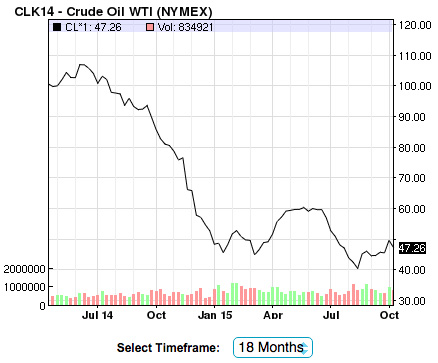Before I even get started on today’s post, I want to add the disclaimer that this post is meant to be unbiased, and free of politics. As many of you know, I am an investor and follow many different markets and sectors. It just so happens that the oil market has been incredibly volatile this year, making it a superb business case study. As someone who has been following the oil market closely, today’s post extrapolates some business lessons that I have personally learned from the volatility.
Lesson 1: Never Count On The Status Quo

As a technology executive of many years, I have lived this lesson a multitude of times. With the price of oil declining from $100 to the mid-$40s literally overnight, this extreme volatility in an old world sector reminds all of us to never rest on our laurels. Business is dynamic and we need to be prepared for anything.
Knowing that my world can change at any minute, I’m a huge fan of strategic scenario planning. In the moment, it’s too late to formulate your strategy to a major disruption. That’s why I like to plan out all possible business cases ahead of time, having a complete strategy for each. I ask myself: "What would I do if XYZ were to happen tomorrow?" To the extent possible, I also pre-plan and do the work required for each scenario, giving me a head start should I ever have to react to a major disruption.
Lesson 2: Never Underestimate Your Competition
The root of the big decline in oil prices? Many suggest that OPEC decided to ramp up production and flood the market with a surplus of oil. The hypothesis behind their move? They wanted to corner their market, and force some of the higher cost oil frackers out of business. OPEC knows that their aggregate cost of production is a lot lower than some of their newer fracker competitors, and wanted to drive the price to a level where frackers would be unprofitable.
While this may seem like an aggressive, unfriendly move, that is business people. In fact, this reminds me of the classic Amazon strategy in technology. Amazon is known for running low margins to corner markets and grow their business. They are willing to experience some short-term pain in favor of long-term margin and defensibility.
Never underestimate your competition. In your scenario planning (see Lesson 1 above), always consider the aggressive, corner cases. Plan for the day your competition tries to drive you out of the market, and build your proactive and reactive strategies in advance.
Lesson 3: Be Ready To Jump On Great Opportunities
As you may expect, the prices of oil stocks have plummeted. They got to a point a few weeks ago where many investors thought they would never recover. Those buying oil stocks felt in their gut a deep anxiety when executing trade orders. In my experience, this is exactly the moment it’s ideal to purchase shares. The takeaway: Change and volatility often creates opportunity. Be ready for that opportunity and remember to scenario plan for opportunity, in addition to catastrophe.
I’d like to add a disclaimer here that this is not meant to be a politically-charged article and I’m neither in-favor nor against oil and oil stocks for the purpose of this article. I’m merely looking at a sector and extrapolating insights. Although, in full disclosure, I must admit that I do personally own several oil and oil-related companies, and did execute some purchase orders during the lows a few weeks back.
Lesson 4: Run A Tight Balance Sheet
Leverage is a really fascinating concept. In good times, it can do so much to accelerate your growth. In bad times, it can destroy your business. With interest rates at historic lows for many years now, I wanted to offer a reminder to be mindful of your leverage. While interest rates are low for now, they will not always be that way. Carrying enormous debt on your balance sheet certainly doesn’t help when your profits plummet for a sustained period. It hurts even more if your debt needs to be refinanced at higher interest rates in coming years (while your business is suffering).
Will oil prices recover? In my opinion, absolutely. How long will it take? Probably a long time. In analyzing the oil players in the market, I tend to gravitate towards those with very healthy balance sheets and away from those with too much debt. Remember this lesson in good times and bad. You never know when your world will turn upside down and you certainly don’t want to worry about a huge amount of debt when it does.
Don’t use debt? This lesson also applies to tech startups that are not yet turning a profit. Always protect your cash reserves because you may not be able to get more funding during the next downturn.
Lesson 5: Fight On!
Despite the very challenging market, a key oil executive at a super major mentioned that they will not be cutting their dividend. This very bold statement put investors at ease during a rather volatile time. The key lesson here is one of the fearless leader. As a leader, you need to be prepared for anything. If you are mindful of the lessons above (especially around scenario planning and leverage), you can buy yourself a huge amount of confidence, no matter what crazy situation you face. Companies need strong, bold leaders. Be one and always fight on!
Disclosure: Holding long positions on various oil and oil-related companies.
Image of oil price © Nasdaq – http://www.nasdaq.com/markets/crude-oil.aspx?timeframe=18m
